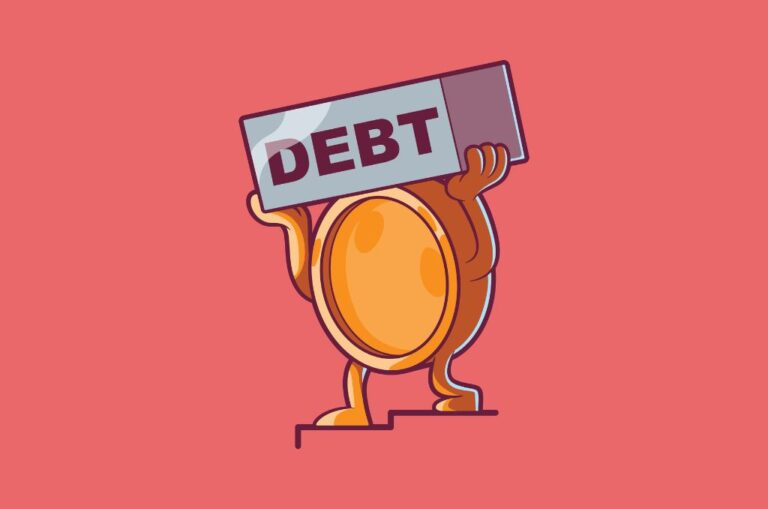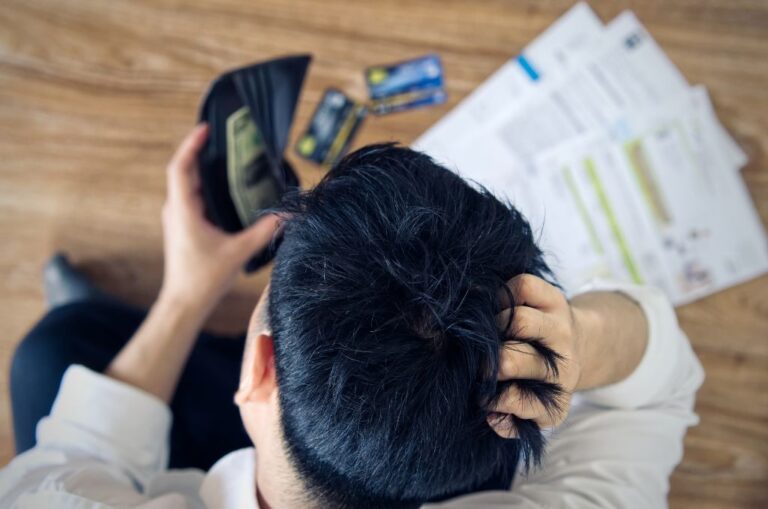In the hit tv show “The Office,” Michael Scott finds himself wallowing in debt he can’t pay off. While trying to escape his creditors, he yells, “I Declare Bankruptcy!” Unfortunately, as Michael Scott learned, getting out of debt is not as easy as stating – sorry, declaring your financial status.
Many people helplessly watch as their credit card debt goes off the roof and wonder if filing bankruptcy is a “free pass” out of debt. While declaring bankruptcy is a (pretty extreme) way to correct debts, it should be the absolute last resort.
Bankruptcy can severely damage your credit score, and sometimes it may not even be enough to get rid of debt. If you do need to file for bankruptcy, though, you have the opportunity for a financial rebirth. So who needs to file bankruptcy, and what is it?
What Is Bankruptcy?
Misfortune seems to strike you from all corners, with unexpected job loss, medical bills, and the rising cost of living leaving you hopeless. Your credit card has reached its limit; your old debts are past due dates… you know bankruptcy is staring at you.
Bankruptcy is a legal process where a couple, individual, or business incapable of repaying their debts can deliver payment under a specified plan or be relieved of the debt. The debtor files a petition or, in some instances, a creditor will. Your existing personal assets will be evaluated and sold to repay a portion of the outstanding debt.
Now that’s a lot of “legalese” to throw at you, so here’s what it means in plain English. When you file bankruptcy, a court of law will take a look at your current financial situation, including everything you own (your “assets”).
Then, the court might determine that you need to pay some or all of the debt on a payment plan. If the situation is extreme enough, all of your debt will be forgiven, and your “assets” may be sold to pay a portion of the debt instead.
How To File For Bankruptcy?
Filing for bankruptcy involves several key steps. Firstly, assess your financial situation, taking into account your debts, assets, income, and expenses. Next, attend credit counseling, a mandatory requirement under U.S. law. This helps you explore alternatives and gain a clearer understanding of your financial status.
Types Of Bankruptcy: Choose Between Chapter 7 Or Chapter 13
Bankruptcy Chapter 7
This type of bankruptcy is also called “straight” bankruptcy and is generally what you think of when you hear “bankruptcy.” However, it’s much harder to qualify for, and the conditions may make you think twice about jumping to Chapter 7 filing.
Chapter 7 bankruptcy mandates the federal court trustee to oversee the liquidation of any non-exempt assets.
Simply put, this form of bankruptcy will wipe out your debt… but sell all of your stuff (with the exception of what you need to live).
Some “reasonably necessary assets” include personal items, tools of the trade, social security, pensions, part of home equity, and a personal automobile to a certain value.
The sale proceeds are then used to offset your creditors, and the debt balance is eliminated. Chapter 7 doesn’t get rid of taxes, alimony, student loans, or child support, so you’ll still be responsible for these debts.
Bankruptcy Chapter 13
This bankruptcy allows you to keep your property, but you will need to pay back your debt – partially or in full – over a period of 3 to 5 years. Once you complete the repayment plan as agreed, the debt will be discharged.
Chapter 13 bankruptcy is kinder to your credit score than bankruptcy chapter 7 because it requires partial or full payment on debts.
Gather all necessary financial documents, including tax returns, pay stubs, and asset-liability lists. Then, complete and submit the relevant bankruptcy forms, ensuring accuracy and completeness. Pay the required filing fee or request a waiver if necessary.
Upon filing, an automatic stay comes into effect, providing temporary relief from creditor collection efforts. Attend the Meeting of Creditors, where the trustee and creditors may ask questions about your finances. If filing for Chapter 7, receive a discharge upon meeting all requirements, effectively eliminating eligible debts.
For Chapter 13 filers, successful completion of the repayment plan is necessary before obtaining a discharge. Lastly, complete a financial management course from an approved agency before receiving the final discharge. Consulting with a bankruptcy attorney or financial advisor throughout the process is highly recommended for personalized guidance.
How Filing Bankruptcy Affects Your Credit Score?
Bankruptcy filing is a tradeoff. On one hand, it reduces or wipes debts you can’t pay. On the other, it informs potential creditors that you’re a credit risk.
Bankruptcy trashes your credit score, making it difficult to get a mortgage, bank loan, or credit card. The dust will settle, but it could take up to ten years of positive credit action.
On the plus side, you probably already have a low credit score if you’re filing bankruptcy, and getting out from under all that debt can help you rebuild.
Before you run to filing bankruptcy, it’s important to know the consequences. All potential lenders will be alarmed when they see “bankruptcy” on your credit report.
This might be a big problem if you’re planning to, say, buy a home within the next ten years. If you’re not planning to make any big purchases and you’re willing to put in the work, though, bankruptcy can help you “start over.”
How To Rebuild Creditworthiness After Bankruptcy?
Bankruptcy is not a financial Armageddon, dealing damage you’ll never recover from. There are practical steps you can take to improve your credit score and rebuild your reputation.
Examine your credit report
Familiarizing yourself with your credit report is a perfect place to start. When you know what contributes to your credit score, you can make changes that increase it. This is also a good time to identify inaccurate information hurting your credit score and correct it.
Follow up on your credit score
Once the bankruptcy proceeding is complete, don’t forget to confirm your score. Monitoring your credit score will also help you spot anything that could raise red flags, such as identity theft or fraudulent loans applied in your name.
Practice responsible credit habits
Habits that help you build a positive credit score are pretty easy. Make payments on time (including bills!) and keep your credit utilization under 30%. This means that if you’re approved for $5,000 on a credit card, you should use no more than $1,500 before paying it off.
Utilize credit-builder Loans
Speaking of credit cards, you may want to check out credit builder loans. A credit builder loan lets the lender keep money in a secured account in your name.
Then you’ll make regular monthly payments until the loan and interest are repaid. Your bank often reports your repayment history of credit-builder loans to credit bureaus, which improves your score.
Avoid Bankruptcy Fraud
Filing bankruptcy is a legal process. This means that giving inaccurate information to “get around” the law can have serious consequences, such as a hefty fine or criminal charge. Some of the most common forms of bankruptcy fraud include:-
- Hiding assets to avoid forfeiture.
- Giving misleading information.
- Turning in incomplete forms.
- Filing for bankruptcy several times in different jurisdictions.
- Trying to bribe an appointed trustee.
Who Declares Bankruptcy In The U.S.?
Bankruptcy is a legal process that offers help to people and businesses facing tough financial times. It’s like a safety net when money troubles become too much. Let’s explore who usually turns to bankruptcy for assistance.
Individuals Seeking Help
1. High Medical Bills: Sometimes, when people get really sick, the bills from the hospital can be very expensive. Even if they have insurance, it might not cover everything. So, some people choose to use bankruptcy to get relief.
2. Losing a Job or Having Less Income: If someone loses their job suddenly or doesn’t earn as much money as before, it can be really hard to pay bills. That’s when they might think about using bankruptcy.
3. Too Much Credit Card Debt: Using credit cards a lot and owing a large amount of money can be a problem. Especially when the credit card companies charge a lot of extra fees. In this situation, some people opt for bankruptcy.
4. Parents Splitting Up: When parents decide not to live together anymore, it can be tough on the family’s money. There are extra costs, like lawyers, and it’s harder to share money. So, some parents might consider bankruptcy.
5. Risk of Losing a Home or Car: If someone can’t make payments for their home or car, they might have to give it back. This is really hard. That’s when bankruptcy can step in to help.
Businesses In Need Of Assistance
1. Money Mistakes: Sometimes, businesses make mistakes with their money. They might spend too much or not get enough customers. This can lead to money problems, and bankruptcy might be a way to fix it.
2. Market Changes: Imagine if a new store opened up next to your favorite one. Suddenly, fewer people go to your favorite store. This can make it hard for the store to make money. In this situation, they might think about bankruptcy.
3. Legal Problems: If a business has trouble with the law, it can cost a lot of money. This can put a big strain on their finances. So, bankruptcy could be a way to handle these costs.
4. Too Much Debt: Sometimes, businesses owe a lot of money and it’s just too much for them to handle. This is when they might consider bankruptcy.
Why Declare Bankruptcy? Is It Right For Me?
If you are still wondering whether declaring bankruptcy is the right step for you, take a moment to consider the following points:-
1. Too Much Debt: Are you having trouble paying back your debts, even if you’re trying really hard? Bankruptcy might be able to help.
2. Basic Expenses: Are you struggling to pay for important things like your home, food, and bills because of your debts? Bankruptcy could give you some relief.
3. Types Of Debts: Some debts, like credit cards or medical bills, are considered when thinking about bankruptcy. Also, if you might lose your home or car because you can’t pay, bankruptcy can protect them.
4. Legal Troubles: If you’re in trouble because of debts, like being sued or having money taken from your paycheck, bankruptcy can stop these things from happening.
5. Future Money Plans: Remember, bankruptcy can affect your credit for a long time. It’s also a good idea to talk to a money expert to see if it’s the right choice. They can help you make the best decision so you can start fresh and get back on track.
Pros And Cons Of Bankruptcy
Pros:
- Offers a fresh financial start.
- Stops creditor harassment.
- Protects essential assets (Chapter 7).
- Provides a structured repayment plan (Chapter 13).
Cons:
- Damages your credit score.
- Becomes a public record.
- Limits access to credit.
- May involve loss of non-exempt assets (Chapter 7).
- Has long-term credit consequences.
Debts That Cannot Be Forgiven
1. Student Loans: Generally, student loans are not eligible for discharge in bankruptcy proceedings, except in cases of extreme hardship.
2. Certain Taxes: Recent income tax debts, along with other specific tax obligations, are typically considered non-dischargeable in bankruptcy.
3. Child Support And Alimony: Court-ordered payments for child support and spousal support are not subject to discharge.
4. Criminal Fines And Restitution: Debts arising from criminal convictions, including fines and restitution, are typically not forgivable through bankruptcy.
5. Debts From Personal Injury Or Wrongful Death: Debts resulting from personal injury or wrongful death claims, particularly if caused by drunk driving or intentional misconduct, are often not dischargeable.
6. Debts From Fraud Or Theft: Debts incurred through fraudulent or dishonest acts, such as embezzlement or theft, are typically not eligible for discharge in bankruptcy.
Alternatives To Filing Bankruptcy
While filing for bankruptcy can provide relief from overwhelming debt, it’s crucial to consider other options before making such a significant financial decision. Here are some viable alternatives to explore:-
1. Negotiating With Creditors: Reach out to your creditors to discuss repayment plans, interest rate reductions, or settling for a lesser amount. Many creditors are willing to work with you to avoid the complexities of bankruptcy.
2. Debt Consolidation: Combining multiple debts into a single, manageable payment can streamline your finances. This often involves securing a consolidation loan or enrolling in a debt management program.
3. Credit Counseling: Engaging with a reputable credit counseling agency can provide valuable financial education, budgeting assistance, and debt management strategies.
4. Debt Settlement: This involves negotiating with creditors to settle debts for less than the full amount owed. It can be a viable option for individuals with significant unsecured debts.
5. Creating A Repayment Plan: Establishing a realistic repayment plan by prioritizing your debts based on interest rates, due dates, and amounts owed can help regain control over your financial situation.
Should I File For Bankruptcy?
Deciding whether or not to file for bankruptcy is a significant financial decision. Here are some key factors to consider:-
Consider Filing For Bankruptcy If:
1. Debt Becomes Overwhelming: If your debts have become too much to handle, and making payments is a constant struggle, bankruptcy might provide much-needed relief.
2. No Viable Alternatives: After exploring options like negotiation, debt consolidation, or credit counseling, you may find that bankruptcy is the best course of action.
3. Facing Legal Action: If creditors are threatening legal action or have already taken legal steps against you, filing for bankruptcy can put a stop to these proceedings.
4. Few Significant Assets: If you don’t have substantial assets or property that could be at risk in a bankruptcy proceeding, it may be a more practical choice.
Consider Alternatives If:
1. Your Income Covers Debts: If your income is sufficient to reasonably cover your debts, it’s worth exploring alternatives before resorting to bankruptcy.
2. Manageable Debt Load: If your debts are within manageable limits, and you can see a clear path to paying them off, bankruptcy may not be the necessary solution.
3. Non-Dischargeable Debts Predominate: If most of your debts are non-dischargeable (such as student loans or recent taxes), bankruptcy may not be the most effective option.
Conclusion
Finding that you need to file bankruptcy can be a nightmare, but it may offer you a financial lifeline when you’re out of other options. Before filing bankruptcy, make sure you’ve exhausted all your other options. Bankruptcy can wreck your credit score for a long time, making it hard to get back to a baseline.
On the other hand, you can’t do anything when you’re drowning in debt. No matter where you are in your financial journey, education is the first step. That’s why Penny Calling Penny has a newsletter! When you sign up, you’ll get practical tips, and more articles like this one delivered right to your inbox, so you never miss a single one.
FAQs
Declaring bankruptcy involves a legal process where an individual or business declares inability to repay debts. Assets may be liquidated to pay off creditors, providing a fresh financial start.
Yes, filing for bankruptcy can have a negative impact on your credit score and financial reputation. It may make it more challenging to obtain credit in the future.
While it’s possible to declare bankruptcy without an attorney (known as pro se), it’s highly recommended to seek legal counsel. A bankruptcy attorney can provide expert guidance and ensure all legal requirements are met.








